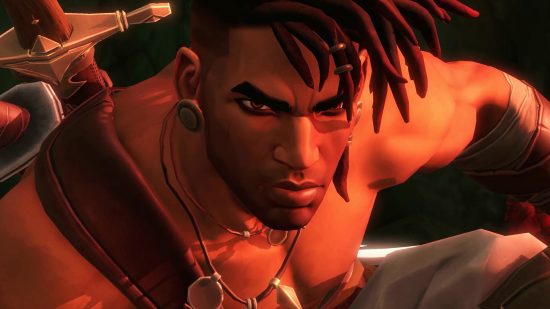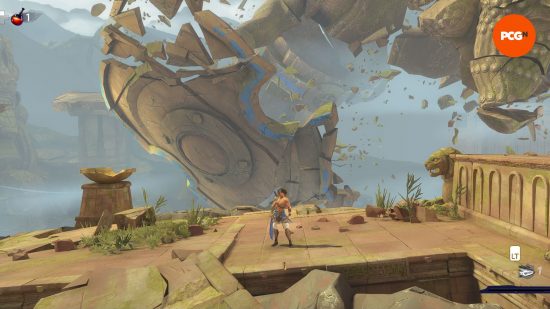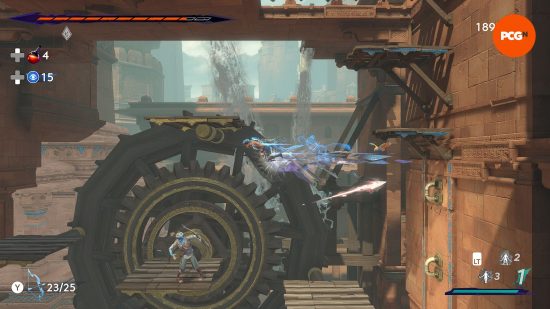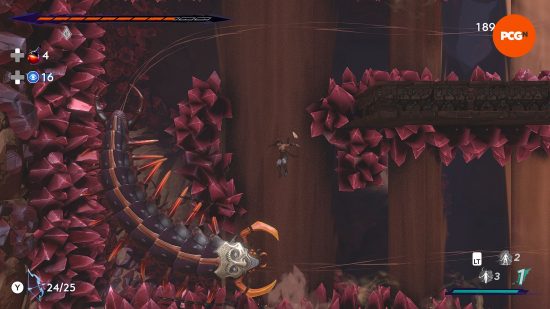Our Verdict
Prince of Persia: The Lost Crown is simultaneously overblown and undercooked in some areas, but it nails the fundamentals of combat, platforming, and exploration, making for a strong Metroidvania adventure and an exciting new entry in a legendary game series.
Ubisoft Montpellier is the studio you call when you want a 2D platformer to rival the greats. Maker of Rayman Origins and Legends, Montpellier knows exactly how to create a fast, fluid, and mechanically engaging 2D adventure. My Prince of Persia The Lost Crown review is going to explore just that, alongside exactly how Ubisoft has made a banger of a Metroidvania to start 2024, even if it’s too expansive for its own good.
On the whole, Prince of Persia The Lost Crown is a sizable Metroidvania that has real depth to its combat, platforming, and the ways these two pillars weave together amid the steady stream of creative powerups. Even with essentially no upgrades or items to find during your time in the sprawling Mount Qaf, The Lost Crown’s combat and movement have a great-feeling flow from the outset, and adding new abilities to the mix only accentuates this.

Montpellier’s excellence in 2D platforming also pairs well with the Prince of Persia series’ penchant for time travel shenanigans and powers, allowing the game to conjure fresh ideas. That is until Montpellier threatens to shoot itself in the foot after squandering a few too many narrative elements further into the adventure.
Before we get there, however, I want to first celebrate some of what the game does well, including its tough-as-nails platforming challenges. These double as impressive showpiece moments, even if the precise hitboxes on the insta-reset spikes had me feeling like a dog repeatedly running into a set of screen doors at points.
The further you progress, the more you’ll rely on your newfound time-based abilities, and here The Lost Crown shines even more. Like Jackson Pollock adding layers to a painting, every wall jump, slide, backflip, and dash comes together a little more with each fresh ability. Nothing feels wasted, and all the moves and abilities work in tandem so well that The Lost Crown could provide the basis for many Metroidvania games to come.
Much like the core of The Lost Crown’s platforming, the game’s combat is mostly excellent. It’s fluid, there’s an ease of understanding, and it’s a pure joy to slide around slicing dudes. My main issue with the combat is one that the platforming nails the reverse of, in that you never really need to use all the abilities. The bosses are well-designed and outright force you to use your new abilities in interesting ways, but the moment-to-moment combat outside of these encounters only demands the basics.
The combat feels great, and I don’t doubt that clips of people stringing all the abilities together will make the rounds online. But the standard enemy roster seldom requires you to make use of them. You simply hit far-away enemies with an arrow or jump at them, then do a sword dance with the rest.
Now, up to release you may have heard that Prince of Persia The Lost Crown is around 25 hours long. I wrapped the story and did a good chunk of the side missions and collectibles within 20 hours, but even then it felt a bit too bloated. Don’t get me wrong, it’s not a massively overlong Metroidvania, but the mid-game in particular is rather drawn out. This also spoils the pace at which you get some of the powerups, leading to repetition and a sense that the game doesn’t quite have enough going on to fill the protracted runtime.
In a similar vein, The Lost Crown’s narrative is filled with squandered potential. I know this isn’t going to be on the top of the list of reasons most people are playing the game, but there are so many excellent ideas and setups in The Lost Crown that go nowhere. Mount Qaf is a location cursed to be in perpetual time hell, which Montpellier uses in some interesting ways to tie the gameplay and world together. But then the actual narrative feels like it’s both working backward from the setting and sometimes actively against it, cutting off ideas at the neck.
Multiple ideas that could have factored into the gameplay, or that would have tied the entire series together in meaningful ways, get batted aside almost instantly. It’s difficult for me to explain the details without spoiling everything, but suffice it to say it’s deeply frustrating to see sparks of inspiration being repeatedly snuffed out. Other narrative annoyances include odd decision-making and motivations from our protagonist, Sargon, and the fact that Mount Qaf’s time rules are never truly explained in the main story, making for an ill-paced and abrupt ending.
I also want to talk about the game’s most inspired feature that will undoubtedly start cropping up across the genre: memory shards. These are consumables that allow you to take in-game screenshots that are attached to the map wherever you took them. This instantly lets you check an area you want to come back to and uses the clearest visual language possible (a picture of the literal game) to tell you why you want to go back there. Map pins still exist here, but the added extra of memory shards are nothing short of game-changing. I cannot wait to see what other developers do with the concept.
In the end, it’s these new ideas combined with the polished-to-a-sheen combat and platforming that make The Lost Crown worth your time. It can feel extended by committee in the mid-game, and some of its best story ideas remain undercooked, but its core pillars are so skillfully designed that it remains a must-play Metroidvania. Prince of Persia The Lost Crown on Steam Deck would also absolutely rip (especially on the OLED model) if you can get it working. With a demo out in the wild, I’d wholly recommend you try The Lost Crown for yourself. Despite my misgivings, there’s a lot to love in here.



